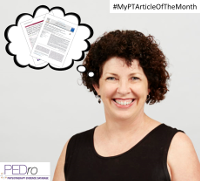
Melissa Locke is a Specialist Paediatric Physiotherapist, as awarded by the Australian College of Physiotherapists. She is Managing Director and co-owner of Movement Solutions Physiotherapy which operates from four locations in South East Queensland and provides physiotherapy services to children, teens and young adults of all abilities. Melissa is also on the Board of Directors for the Australian Physiotherapy Council.
Melissa subscribes to the PEDro Evidence in your inbox feed for paediatrics because it makes it easy to identify relevant, good quality articles in her area of practice and interest. Two articles recently caught Melissa’s attention.
Park-based physical activity interventions improve health in the general population and provide an alternative model of care for people with disabilities. This review identified limited, low level, preliminary evidence demonstrating objective and perceived short-term health and well-being improvements in children/adolescents and older adults with disabilities for park-based interventions. People with disabilities appear to experience the same biopsychosocial health benefits of park-based physical activity as the general population. Melissa says, “I’ve started using park-based physical activity with some of my clients is it is a great way to achieve therapeutic intervention using real-world activities and environments.”
Symptomatic joint hypermobility is a relatively common childhood problem. This is one of the first trials to evaluate the effects of a multidisciplinary intervention programme using rigorous methods. The trial concluded that no additional benefit could be shown from the intervention compared to standard management. Melissa says, “we see many children and young people with symptomatic joint hypermobility in my practice, a treatment alternative which could be tested is the physiotherapist playing a more educational role (possibly using Apps or video blogs) rather than providing hands on care.”



